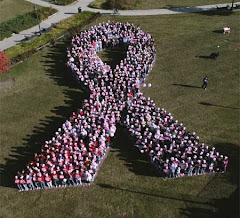Acceptance Speech for Flame of Courage Award
Cancer Hope Network - June 15, 2009
Fear, Faith and Other F Words
Thank you very much for this award. Lindsay said that I have about two minutes, so I tried to focus my thoughts, and I've titled my comments tonight, "Fear, Faith and Other F Words."
All Survivors remember the moment that we are diagnosed - and, for those of us with metastatic disease, we sometimes have a second moment, when we are diagnosed again. In addition to fear, I was confused and felt very isolated because no one really knew my disease or what to do with me.
Over the last 10 years, I have experienced many, many sides of the cancer journey. They have given me a window into a disease that allows me to relate to just about any cancer survivor. I'm lucky that way. Fear is a powerful motivator. Fear pushed me up against a very hard wall. I might not have found a door if it wasn't for Faith.
My faith helped me pull together my own team of medical doctors and alternative practitioners. We work together to find the best way for me to build my immune system to overpower my cancer. I think we're doing a pretty good job.
Organizations like the Cancer Hope Network give survivors a place to start making connections and building their teams.
When I was diagnosed with metastatic disease in October 2006, I was hungry for information about others with rare cancers like mine. Jonathan Alter, also a cancer survivor with a rare metastatic disease, describes this in his cover article in the April 9th, 2007 issue of Newsweek, called “How I Live With Cancer.” He says, “Unfortunately, many hospitals still do little or nothing to connect newly diagnosed patients with those who have survived the same disease for several years, though this is what we crave.”
The Cancer Hope Network offers a solution to this problem. Volunteer survivors teaming up with newly diagnosed patients with similar medical histories gives patients an opportunity to express feelings, talk about fears and concerns, and ask questions of someone who can offer an “I’ve been there” understanding that few others can.
I’ve been asked how I cope with those moments when the reality of my diagnosis surfaces and my mind wanders over to the Dark Side. Having spent a little time on the Dark Side, I eventually realized something rather extraordinary: Death is not the worst thing that can happen. Not living a purposeful life, not leaving an impact, for me, would be far worse.
So my last F word tonight is Front, as in United Front. Cancer patients and our medical teams need to work together toward treatment goals that we actively participate in setting. We research, we learn, and we become knowledgeable, as we fight the helplessness that we feel from a disease that takes control from within. On a broader level, the fight against cancer is best fought with a team approach: Scientists, doctors, survivors and their families, working together to set goals, make connections, and think outside the box, all in the name of healing. I applaud all of you tonight for being part of this United Front.
I promise not to put this award on a shelf until it is time to pass it to next year's recipient. I promise not to take it for granted. I will do my best to live up to all that the Flame of Courage represents.
Thank you.
Kathy
CANcer + HEALth = CAN HEAL

.bmp)
I was dx in Nov. 08 with ACCb and just found your blog a couple wks ago. I wondered how big was your original tumor and did regular lung xrays ever show your lung nodules or did they only show on the PET/CT? Please email me at wowmommo@yahoo.com if you would like to respond. I would really appreciate it. My dr. only wants to follow me with annual chest xrays and I'm curious if this is appropriate followup. Thanks for your time and your blog!
ReplyDeleteKaren Schulte
Hi Karen,
ReplyDeleteThanks so much for your comments and questions. My breast tumor was just under 3 cm. It did not show up on my routine x-rays. X-rays don't show as much as a CTs or MRIs. Since ACCb is most likely to spread to the lungs if it spreads at all (which is rare), I am a fan of CTs for follow up for this disease instead of x-rays. A lot of times, insurance companies don't approve CTs for follow up because they are so much more expensive than x-rays. Many doctors may not want to expose patients to CT radiation if there is no reason to suspect metastasis. This is definitely an important question to discuss with your doctor. You may want to talk about getting a chest CT as a baseline, and then repeat it every year or two. Keep in mind that most of us have spots on our lungs from living in a dirty world. The lungs are filters, and it's sometimes hard to separate something worrisome from something unproblematic. But at least you would have something to compare year after year.
Hope this helps.
Kathy
CANcer + HEALth = CAN HEAL